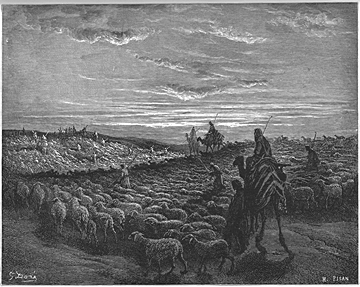Genesis 12
1 Then the Lord said to Abram: “Depart from your land, and from your kindred, and from your father’s house, and come into the land that I will show you.
Un Tas Kungs sacīja uz Ābramu: izej no savas zemes un no savas dzimtenes un no sava tēva nama uz to zemi, ko Es tev rādīšu.
2 And I will make of you a great nation, and I will bless you and magnify your name, and you will be blessed.
Un Es tevi darīšu par lielu tautu un tevi svētīšu un darīšu tavu vārdu lielu, un tu būsi par svētību.
3 I will bless those who bless you, and curse those who curse you, and in you all the families of the earth will be blessed.”
Un Es svētīšu tos, kas tevi svētī, un nolādēšu tos, kas tevi lād, un iekš tevis visas ciltis virs zemes taps svētītas.
4 And so Abram departed just as the Lord had instructed him, and Lot went with him. Abram was seventy-five years old when he departed from Haran.
Un Ābrams aizgāja, kā Tas Kungs tam bija sacījis, un Lats gāja tam līdz. Un Ābrams bija septiņdesmit un pieci gadus vecs, kad viņš no Hāranas izgāja.
5 And he took his wife Sarai, and Lot, the son of his brother, and all the substance which they had come to possess, and the lives which they had acquired in Haran, and they departed in order to go to the land of Canaan. And when they arrived in it,
Un Ābrams ņēma Sāraī, savu sievu, un Latu, savu brālēnu, un visu savu mantu, ko tie bija mantojuši, un tās dvēseles, ko tie Hāranā bija dabūjuši, un tie izgāja, ka ietu uz Kanaāna zemi, un tie nonāca Kanaāna zemē.
6 Abram passed through the land even to the place of Shechem, as far as the famous steep valley. Now at that time, the Canaanite was in the land.
Un Ābrams pārstaigāja to zemi līdz Šehemes vietai, līdz Mores ozolam; un Kanaānieši bija to laiku tai zemē.
7 Then the Lord appeared to Abram, and he said to him, “To your offspring, I will give this land.” And there he built an altar to the Lord, who had appeared to him.
Tad Tas Kungs parādījās Ābramam un sacīja: tavam dzimumam Es došu šo zemi; un viņš tur uztaisīja altāri Tam Kungam, kas viņam bija parādījies.
8 And passing on from there to a mountain, which was opposite the east of Bethel, he pitched his tent there, having Bethel to the west, and Hai on the east. He also built an altar there to the Lord, and he called upon his name.
Un no turienes viņš cēlās uz tiem kalniem Bētelei pret rītiem, un uzcēla savu telti, ka Bētele bija pret vakariem un Aja pret austruma pusi, un uztaisīja tur Tam Kungam altāri un piesauca Tā Kunga vārdu.
9 And Abram traveled, going out and continuing further on, toward the south.
Un Ābrams cēlās un gāja iedams uz dienvidu(Negebu) pusi.
10 But a famine occurred in the land. And Abram descended to Egypt, to sojourn there. For famine prevailed over the land.
Un tanī zemē bija bads, un Ābrams nogāja uz Ēģipti, tur mist, jo tas bads bija grūts tanī zemē.
11 And when he was close to entering Egypt, he said to his wife Sarai: “I know you to be a beautiful woman.
Un notikās, kad bija nonācis tuvu pie Ēģiptes, tad viņš sacīja uz Sāraī, savu sievu: redzi, es zinu, ka tu no vaiga esi skaista sieva.
12 And when the Egyptians see you, they will say, ‘She is his wife.’ And they will put me to death, and retain you.
Un kad ēģiptieši tevi redzēs, tad tie sacīs: šī ir viņa sieva, - un mani nokaus, un tevi atstās dzīvu.
13 Therefore, I beg you to say that you are my sister, so that it may be well with me because of you, and so that my soul may live by your favor.”
Saki jel, ka tu mana māsa, lai man labi klājās tevis dēļ, un mana dvēsele tevis dēļ paliek dzīva.
14 And so, when Abram had arrived in Egypt, the Egyptians saw that the woman was exceedingly beautiful.
Kad nu Ābrams nāca Ēģiptes zemē, tad ēģiptieši redzēja to sievu, ka tā bija ļoti skaista.
15 And the princes reported it to Pharaoh, and they praised her to him. And the woman was inducted into the house of Pharaoh.
Un Faraona lielkungi viņu redzēja, un to slavēja Faraona priekšā, un tā sieva tapa ņemta Faraona namā.
16 In truth, they treated Abram well because of her. And he had sheep and oxen and male donkeys, and men servants, and women servants, and female donkeys, and camels.
Un šis Ābramam darīja labu viņas dēļ; un tam bija avis un vērši un ēzeļi un kalpi un kalpones un ēzeļa mātes un kamieļi.
17 But the Lord scourged Pharaoh and his house with great wounds because of Sarai, the wife of Abram.
Bet Tas Kungs mocīja Faraonu un viņa namu ar lielām mocībām, Sāraī, Ābrama sievas, dēļ.
18 And Pharaoh called Abram, and he said to him: “What is this that you have done to me? Why did you not tell me she was your wife?
Tad Faraons aicināja Ābramu un sacīja: kam tu man to esi darījis? Kāpēc tu man neesi sacījis, ka šī tava sieva?
19 For what reason did you claim her to be your sister, so that I would take her to me as a wife? Now therefore, behold your mate, receive her and go.”
Kāpēc tu sacīji, ka šī tava māsa? Jo es viņu sev ņēmu par sievu. Un nu redzi, še tava sieva, ņem viņu un ej.
20 And Pharaoh instructed his men about Abram. And they led him away with his wife and all that he had.
Un Faraons pavēlēja par viņu saviem vīriem, un tie to izvadīja un viņa sievu un visu, kas tam bija.





















